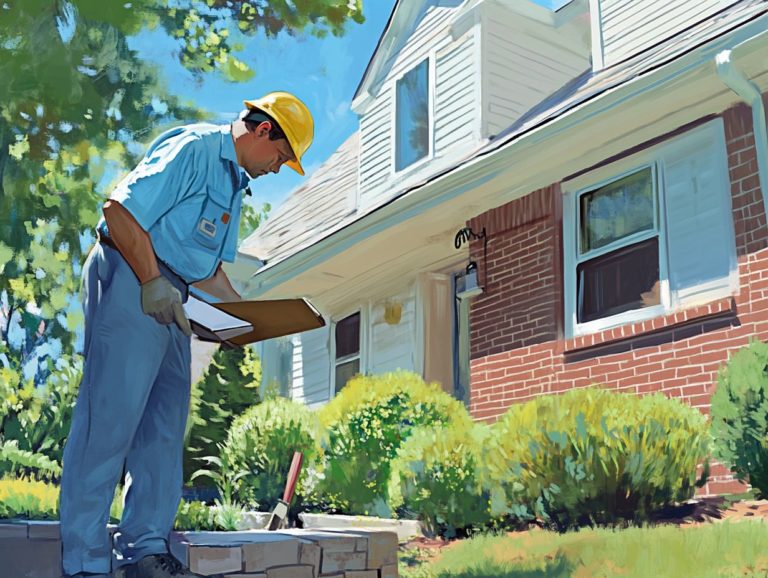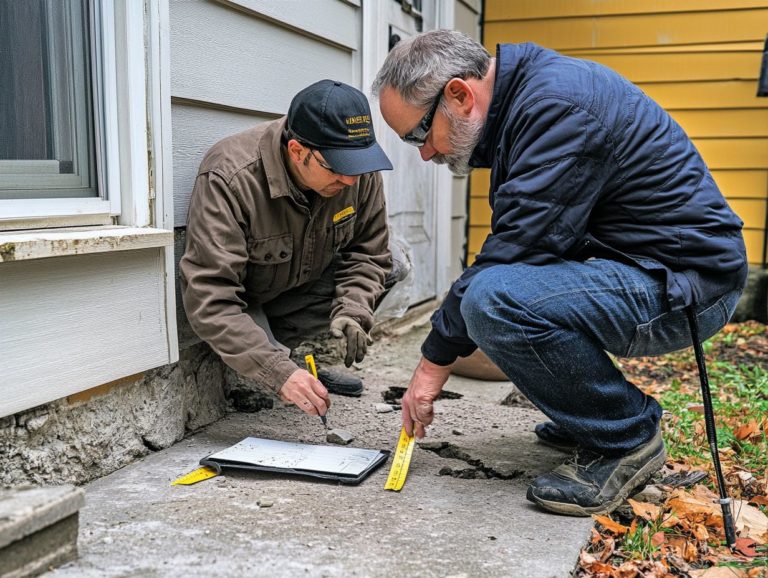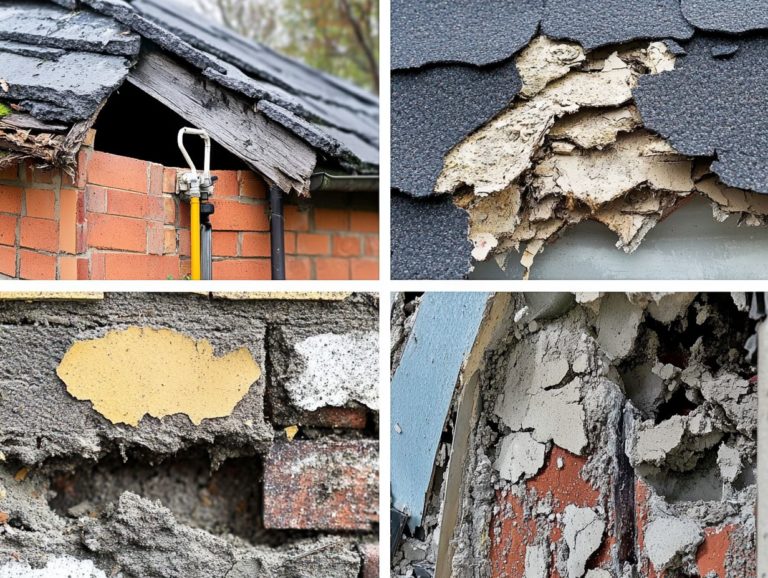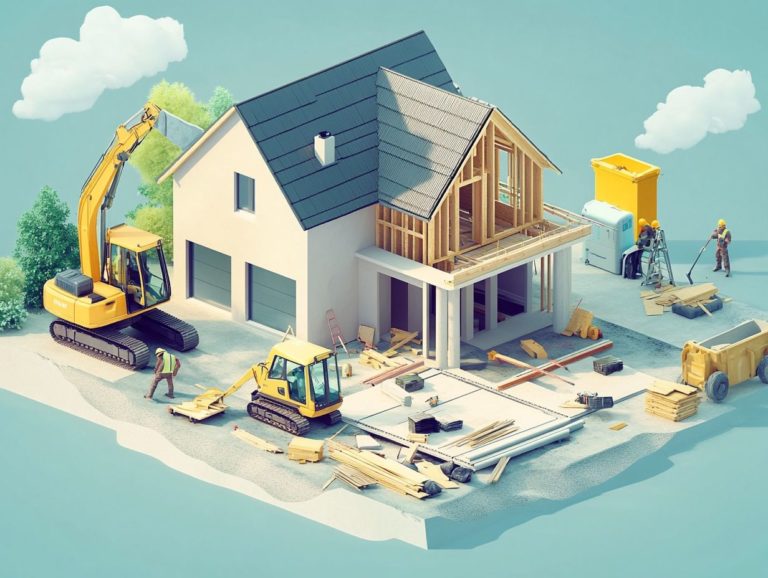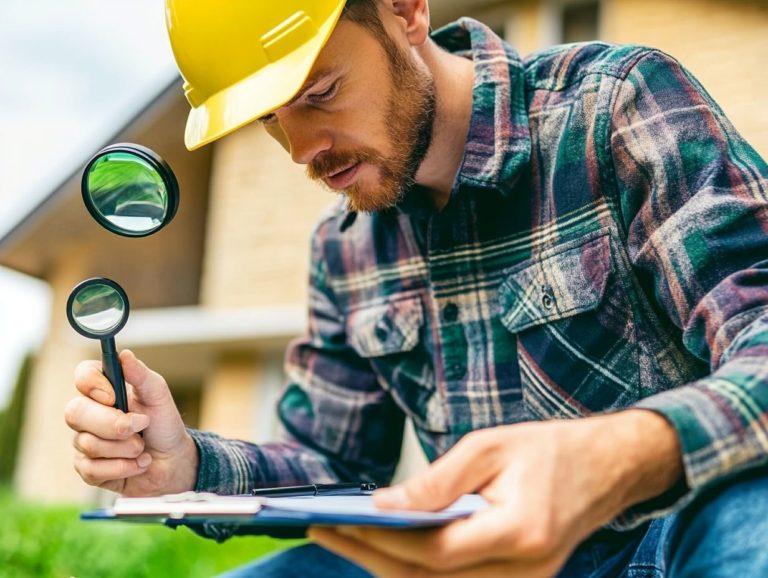The Role of Home Inspections in the Home Buying Process
Buying a home stands as one of the most significant investments you will make, and ensuring its safety and soundness is absolutely crucial.
Home inspections are important to this process, uncovering potential issues that could influence your decision. This guide will arm you with essential knowledge for your home-buying journey.
Contents
- Key Takeaways:
- The Importance of Home Inspections
- What to Expect During a Home Inspection
- Types of Home Inspections
- General Home Inspection vs. Specialized Inspections
- Common Issues Found During Home Inspections
- Structural, Electrical, and Plumbing Problems
- Negotiating After a Home Inspection
- Tips for Choosing a Home Inspector
- Frequently Asked Questions
- What is the role of home inspections in the home buying process?
- Who typically pays for the home inspection?
- What can be expected during a home inspection?
- Can a home inspection affect the sale price?
- What happens if a home inspection uncovers major issues?
- Is a home inspection mandatory when buying a home?
Key Takeaways:
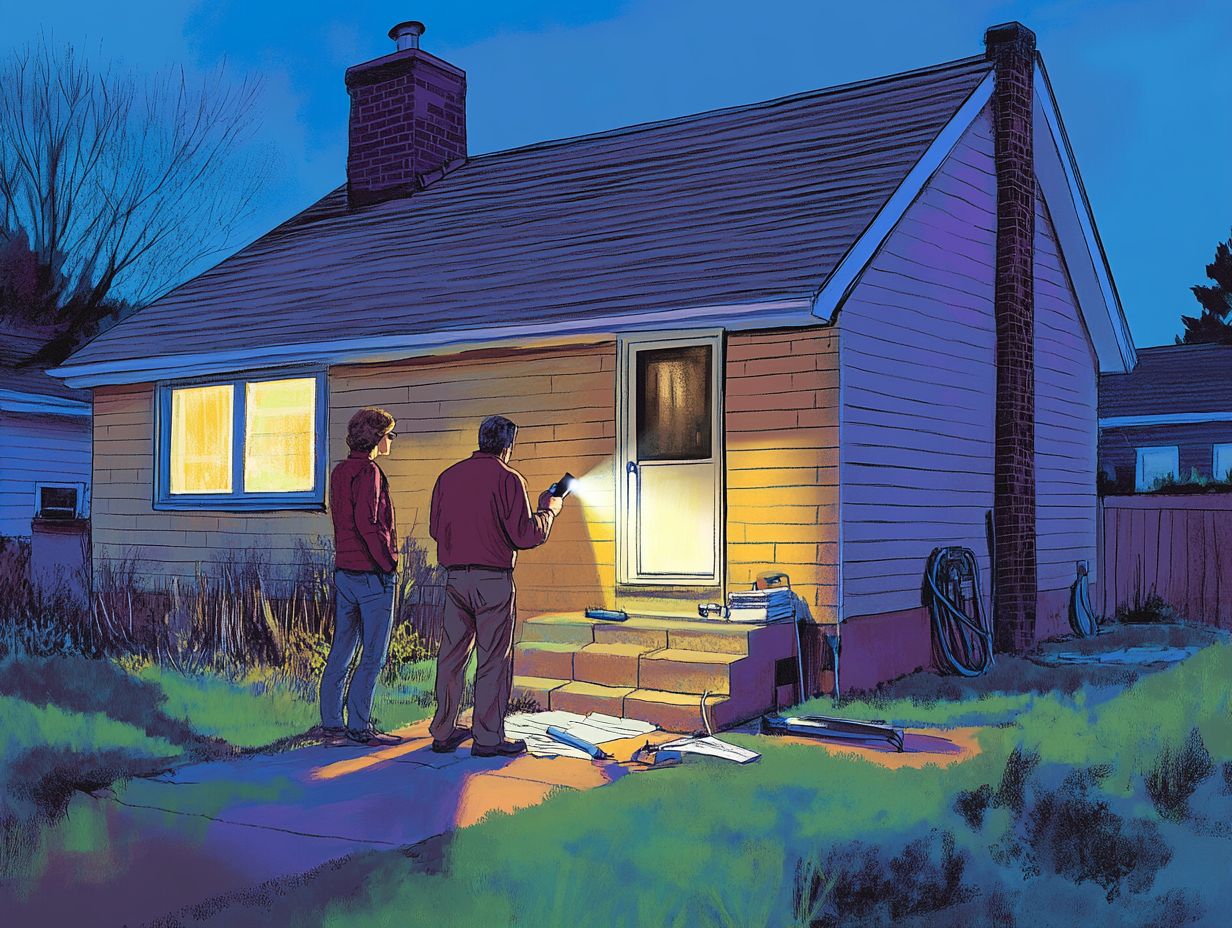
Home inspections are a crucial step in the home buying process to ensure the safety and soundness of the property.
A home inspection typically includes a thorough examination of the property’s structure and systems for potential issues.
Understanding the different types of home inspections and the role of a home inspector can help buyers negotiate any issues found, enabling them to make informed decisions and avoid costly surprises.
The Importance of Home Inspections
Home inspections play a crucial role in the real estate process, especially for buyers who wish to understand the home inspection process to make informed decisions.
In California, engaging a licensed home inspector (a professional who checks the home for problems) can reveal significant defects that could affect both the safety and value of a property.
Whether you’re a first-time homebuyer or a seasoned investor, grasping the importance of home inspections is essential. It enables you to protect your investment and ensures that you are fully aware of any potential issues before finalizing your purchase offer.
Why Home Inspections are Necessary
Home inspections are essential for ensuring the safety and structural integrity of your property.
They uncover both major and minor issues that could pose serious risks for those living there.
By adhering to various safety regulations during these assessments, you proactively identify potential hazards and address them promptly.
Catching problems early not only cuts down on repair costs but also reduces the risks of more significant dangers later on.
Engaging reputable inspectors like Elite Inspections is crucial in this process; their expertise guarantees a thorough evaluation that helps maintain your home’s value while protecting its occupants from unexpected hazards. For more insights, consider understanding the benefits of home inspections.
This level of diligence ultimately fosters peace of mind for both buyers and homeowners.
What to Expect During a Home Inspection
During a home inspection, you can anticipate a thorough evaluation of the property, led by a qualified home inspector.
They will meticulously assess various systems and components, ensuring everything is functioning as it should.
This process provides you with invaluable insights into the condition of your prospective home, highlighting the importance of understanding the necessity of home inspections, allowing you to make informed decisions.
Step-by-Step Process
A meticulous home inspection process unfolds like a carefully crafted symphony, guided by a detailed checklist that licensed home inspectors adhere to, ensuring that every facet of your property receives the scrutiny it deserves.
It all begins with scheduling the inspection; you ll typically reach out to an inspector who can align with your timeline.
When the day of the inspection arrives, a thorough examination commences, zeroing in on critical areas such as the foundation, where any cracks or shifts could indicate potential stability issues.
Inspectors will then ascend to the roof to identify signs of damage think missing shingles or leaks that could lead to bothersome water intrusion.
The electrical wiring of your home will also undergo a thorough assessment, ensuring that outlets and circuits are up to safety standards and functioning properly.
Once the inspection is complete, you ll receive a comprehensive report detailing the findings and outlining any recommended actions to take.
This insights-rich document serves as your roadmap to maintaining the integrity of your home.
Types of Home Inspections
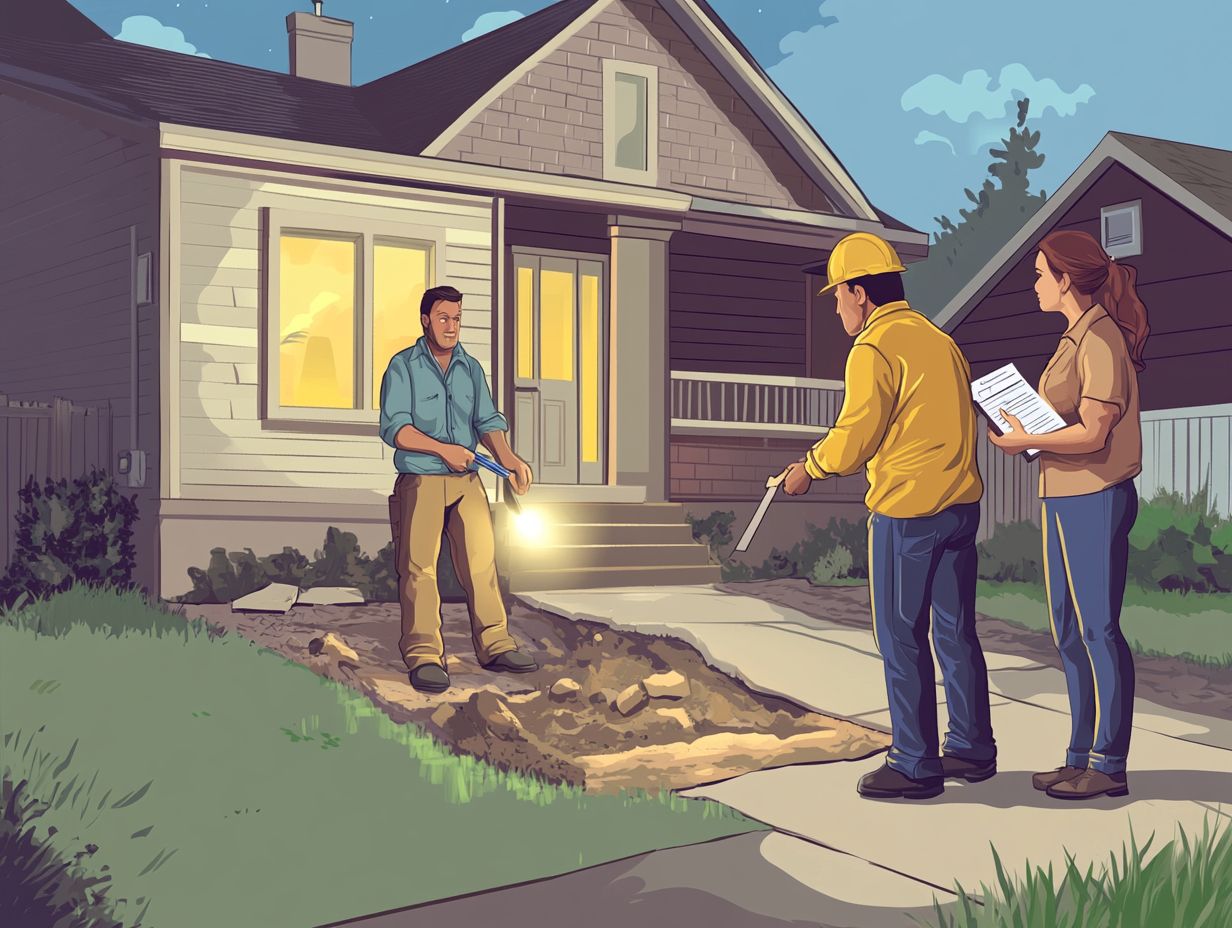
You have a variety of home inspection options at your fingertips:
- General home inspections: Provide a comprehensive overview, addressing a wide array of potential issues.
- Specialized inspections: Delve into specific areas, such as electrical systems, plumbing, or the unique considerations of new home construction.
Each type offers valuable insights tailored to your needs.
Don’t skip the inspection process it’s vital for your peace of mind!
General Home Inspection vs. Specialized Inspections
A general home inspection offers a comprehensive overview of the property’s condition. Specialized inspections delve deeper into specific systems, such as HVAC or structural integrity.
This first step is crucial for your peace of mind! It helps pinpoint potential issues and ensures the home meets safety standards.
For example, during a general inspection, visible signs of wear in the roof or plumbing may prompt a specialized inspection for those areas.
A roof inspection can uncover underlying problems like leaks or structural weaknesses. If left unaddressed, these issues could lead to hefty repair costs down the line.
Specialized inspections reveal important details that routine checks may miss. However, they often require more time and investment.
This underscores the importance of balancing thoroughness and practicality in maintaining your home.
Common Issues Found During Home Inspections
During home inspections, you may encounter a range of common issues. These encompass both major and minor concerns.
Common problems include electrical, plumbing, and roofing issues. Each of these can significantly affect the safety and value of your property.
Structural, Electrical, and Plumbing Problems
Structural, electrical, and plumbing issues are critical elements that impact a home’s safety and livability. They warrant thorough examination during the home inspection process.
Inspectors first check the home’s structure. They look for foundation problems, such as wall cracks or uneven floors.
Next, they assess the electrical systems. They ensure that wiring is up to code, circuit breakers function properly, and outlets are grounded vital checks that protect against potential hazards.
Inspectors check pipes carefully, searching for leaks, corrosion, and adequate water pressure. These are essential factors for maintaining a fully functional home.
Documenting these findings in an inspection report is paramount. It provides a transparent snapshot of the property’s condition, giving buyers peace of mind while equipping sellers with needed knowledge to address issues before finalizing a sale.
Negotiating After a Home Inspection
After a home inspection, you might navigate negotiations between buyers and sellers. This dialogue often centers around the need for home inspections and the issues uncovered during the inspection.
These findings can significantly influence the purchase contract and the overall sale process.
How to Address Issues with the Seller

Addressing issues with the seller after a home inspection requires finesse and clear communication. Present findings in a constructive manner.
Approach the conversation with a collaborative mindset. Focus on solutions instead of merely listing problems.
Start by expressing appreciation for the property and acknowledging any positive aspects noted during the inspection. This sets a friendly tone and paves the way for productive dialogue.
Next, prioritize the most critical concerns and back them up with evidence from the inspection report.
Offering potential remedies like requesting repairs or suggesting a price reduction can create a favorable negotiation environment.
By maintaining a respectful attitude throughout the discussion, you can foster compromises that satisfy both parties.
Tips for Choosing a Home Inspector
Selecting the right home inspector is vital. Seek a qualified inspector with a solid reputation and the necessary licenses.
This ensures you receive a meticulous and trustworthy inspection, giving you peace of mind as you navigate your home-buying journey by understanding the home inspector’s role.
What to Look for in a Qualified Inspector
When you’re looking for a qualified inspector, examine their credentials, experience, and affiliations with reputable organizations like the American Society of Home Inspectors or InterNACHI. These memberships indicate adherence to industry standards and a commitment to ongoing education essential in a constantly changing field.
Look for inspectors with several years of hands-on experience. This often means they have a better understanding of home systems and problems. Customer feedback is also crucial; high ratings and positive reviews are strong signs of reliability and effectiveness.
To verify an inspector’s credentials, check their licensing status and insurance. Don t hesitate to ask for references from past clients. Focusing on these factors can significantly enhance your home inspection experience, providing you with peace of mind during the property transaction process.
Frequently Asked Questions
What is the role of home inspections in the home buying process?
Home inspections are vital in the home buying process, as they provide potential buyers with a thorough check-up of a property’s condition and help identify any problems or repairs that need attention. Understanding the role of home inspectors can further enhance this process.
Who typically pays for the home inspection?

While it may vary based on the sale terms, the home buyer usually pays for the home inspection. This step is crucial to ensure the buyer makes an informed decision and is aware of any repairs or issues before finalizing the purchase.
What can be expected during a home inspection?
During a home inspection, a professional will thoroughly inspect the property, including the structure, foundation, plumbing, electrical systems, and more. They will provide a detailed report of their findings, including recommendations for repairs or further evaluations.
Can a home inspection affect the sale price?
Yes, a home inspection can affect the sale price. If significant problems are identified, the buyer may negotiate with the seller for a lower price or request that the seller fix the issues before proceeding with the sale.
What happens if a home inspection uncovers major issues?
If a home inspection uncovers major issues, the buyer can negotiate with the seller for a lower sale price or ask the seller to make the necessary repairs. In some cases, the buyer might choose to walk away from the purchase.
Is a home inspection mandatory when buying a home?
No, a home inspection is not mandatory when buying a home. However, it is highly recommended to protect the buyer’s investment and ensure they know about any problems or repairs that need to be addressed before finalizing the purchase.

